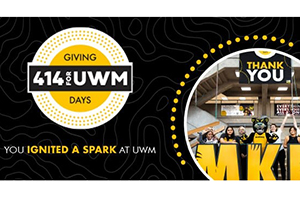The University of Wisconsin-Milwaukee is one of seven institutions that are committing to improving the economy in disadvantaged Milwaukee neighborhoods.
The Milwaukee Anchor Collaborative, comprised of major health care and educational institutions, has pledged to hire more people of color and spend more with minority-owned businesses in the disadvantaged neighborhoods.
The Milwaukee collaborative, modeled on others in cities around the country, was formally announced Aug. 5, though planning and data gathering have been underway for two years, according to Jennifer Abele. She is UWM’s senior executive director of strategic partnerships and a member of Chancellor Mark Mone’s cabinet.
In addition to UWM, partners in the Milwaukee Anchor Collaborative include Aurora Health, Ascension, Children’s Wisconsin, Froedtert Health, the Medical College of Wisconsin and Marquette University.
Harnessing buying and hiring power
The collaborative will focus on using the members’ combined buying and hiring power to help improve economic conditions in certain ZIP codes, whose residents are predominately low income and people of color, according to a statement announcing the effort.
“Our efforts at UWM on diversity, equity and inclusion have been focused on student success and the makeup of our faculty and staff, said Abele. “What this initiative does it takes it beyond those two realms and into a community driven strategy. We are working together with these other institutions to try to move the needle in these targeted ZIP codes.”
Milwaukee Anchor Collaborative members have pledged to increase hiring and corporate spending in Milwaukee’s eight lowest-income ZIP codes: 53204, 53205, 53206, 53208, 53210, 53212, 53216 and 53233.
For people of color – especially those living in the target ZIP codes – Milwaukee ranks among the worst cities in the U.S. in many economic categories.
Lifting people out of poverty
By providing sustainable employment and livable wages, the anchor collaborative’s efforts would lift more people out of poverty. By investing in local businesses, the collaborative would help create jobs – and a ripple effect that revitalizes neighborhoods.
“This is a major commitment by those with the power to make a significant difference,” said Bill Krugler, president of JobsWork MKE (formerly Milwaukee JobsWork), a nonprofit that organized the collaborative. “We’re excited and optimistic this will help lift more people out of poverty and revitalize neighborhoods that have been neglected for too long.”
In anchor collaboratives, which are forming in cities nationwide, members commit to using their collective economic power to employ residents in disinvested neighborhoods and purchase from businesses there.
Similar collaboratives in other cities have made efforts such as combining purchasing power for goods and services from small businesses such as laundering, florist services and catering. The seven members collectively spend $2.9 billion per year on items and services where there could be an opportunity to spend locally, said Abele. Right now, most of it is spent outside of Milwaukee.
“If all of us nudge up our buying power in each of these ZIP codes by just a couple percent, it’s going to improve the economy,” she added. “That’s what is so exciting about this – our combined buying and hiring power is so great.”
Matching job seekers with jobs
Rodney Moutry, director of the Milwaukee Anchor Collaborative, agreed. “People in the target neighborhoods need jobs, and employers need people to fill their open positions,” he said. “Our focus is to identify and prepare people to fill these jobs and establish careers. It becomes a win-win.”
While each institution has some specific job needs, there are many categories such as facilities management, food service and administrative support where all the institutions are interested in hiring people, said Abele. The institutions will work with JobsWork MKE on finding and preparing employees.
“These anchor institutions already have demonstrated they have the economic power, and commitment to our community, to make a positive impact. Now, working together, their impact will be even greater,” said Timothy Sheehy, president of the Metropolitan Milwaukee Association of Commerce.
The institutions are working on their individual plans for purchasing and recruiting efforts in the Milwaukee collaborative, Abele said. Additional details on specific efforts will be announced in this fall.
“This partnership enhances UWM’s strategic pillars of research and talent and community,” she said. Although the planning for this collaboration started before the killing of George Floyd and the subsequent racial justice movement, the effort supports UWM’s continuing efforts to further equity, inclusion and diversity, Abele added.
“It supports the Wisconsin Idea of how our academic institutions can better the communities we live in… How can we be a good community partner in addition to fostering a strong culture among our students, faculty and staff.”






